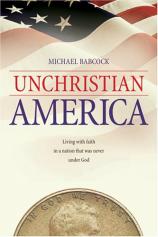Excerpt
Excerpt
UnChristian America: Living with Faith in a Nation That Was Never Under God

The dead face stared back at me as I knew it would. I couldn’t help taking a peek. I was a thirteen-year-old boy, after all, and it was an easy thing to turn around in the cab of the Toyota and peer down at the body wrapped up like a rug in the back of the truck.
It was night in Central Africa, and night in Africa is always dark. I turned back around to see the dirt road ahead of us and the occasional fl ash of animal eyes disappearing into the bush.
"Just wait until we get to the village," Bob told me. "You’ll never see anything like it again. Funerals really bring out the heathen in them." Bob was my dorm father at the boarding school. He was a seasoned missionary, but his comment puzzled me, since this man --- this dead man we were transporting back to the village of his birth --- had been a pastor. I braced myself for what I could only imagine would be a chilling scene. What would death in an African village look like? I conjured up scenes of women wailing as they beat their breasts and threw themselves on the ground. I could already hear the hypnotic pounding of drums and see the eerie flickering of the fires.
I turned around to look one more time into the frozen, leathery face of a man in his forties. Why, I wondered, was Bob preparing me for what we’d see in the village? This man had been a Christian who worshiped Jesus. He had turned his back on the gods of his ancestors, gods of stones and sticks.
"We’re here," Bob said as the dirt road turned into a clearing of thatched-roof huts. There was a large fire burning, just as I’d expected. But as we came to a stop and got out of the truck, I heard singing. The villagers were singing hymns --- in the rhythms and chanted intonations of tribal music. But they were Christian hymns nonetheless. Here in the "heart of darkness" (as Joseph Conrad called it) was the light of the gospel. This light, I came to learn, shines no matter how dark the culture may be. This light, the "light of the glorious gospel," as Paul called it (2 Corinthians 4:4, KJV), still shines brightly after two thousand years because it’s not the product or exclusive monopoly of any culture, including my own.
This would become a benchmark experience for me, one I’d think back on years later when struggling over how to be a Christian in an increasingly secularized America. In particular, I remember that night in Africa whenever I hear someone say that Christianity is on the decline. As the millennium approached, American theologian and Jesus Seminar publicist Burton Mack declared, "It’s over. We’ve had enough apocalypses. We’ve had enough martyrs. Christianity has had a two thousand–year run, and it’s over." But Burton Mack never heard hymns in an African village. He didn’t know Mananga, the old pastor with white hair. When Mananga smiled, which was often, you could see the incisors that had been sharpened to a point many decades before when he was a young man in a tribe of cannibals. The American missionaries I grew up among may have been tone deaf to the nuances of cross-cultural dialogue, but they earnestly believed that the gospel can change lives, families, even entire villages, for the better.
The great error that scholars like Burton Mack make is to tie Christianity to the institutions, culture, and history of the Western world. Certainly, it would come as a great surprise to those in the villages of Africa, Asia, and Latin America that "it’s over" for the church. We can learn much from the non-Western church about living with faith in the midst of an unbelieving world.
Christianity is not a product of the Western world, the way Burton Mack arrogantly assumes. Cloistered in the ivory towers of theology departments, scholars like Mack fail to recognize the vibrancy of Christian faith in Kenya or India or Guatemala. Nor do they see the vitality of evangelical faith in neighborhood churches all across America. All they see are the dead skeletal remains of a bankrupt social gospel. Mack doesn’t speak for Christianity, and he’s certainly not authorized to write its obituary. But what makes Mack interesting is how he embodies a certain type of secularism that has overtaken the West --- and is gradually overtaking America as well. Mack thinks he’s dancing on the grave of Christianity, but it’s only a cultural Christianity, not the real thing.
We’ve lost the cultural battle. We’ve lost the "Christian" America we thought we had but never really did. Everywhere we see the forces of secularism advancing against the revealed truths of God. But this should not alarm us. Christ is triumphant. The spiritual war has been won at the Cross. That’s the message I learned many years ago as the fires flickered in an African village. Along the way, I forgot the message, I lost touch with its power, and I had to learn it all over again.
Excerpted from UNCHRISTIAN AMERICA: Living with Faith in a Nation That Was Never Under God © Copyright 2011 by Michael Babcock. Reprinted with permission by SaltRiver. All rights reserved.


